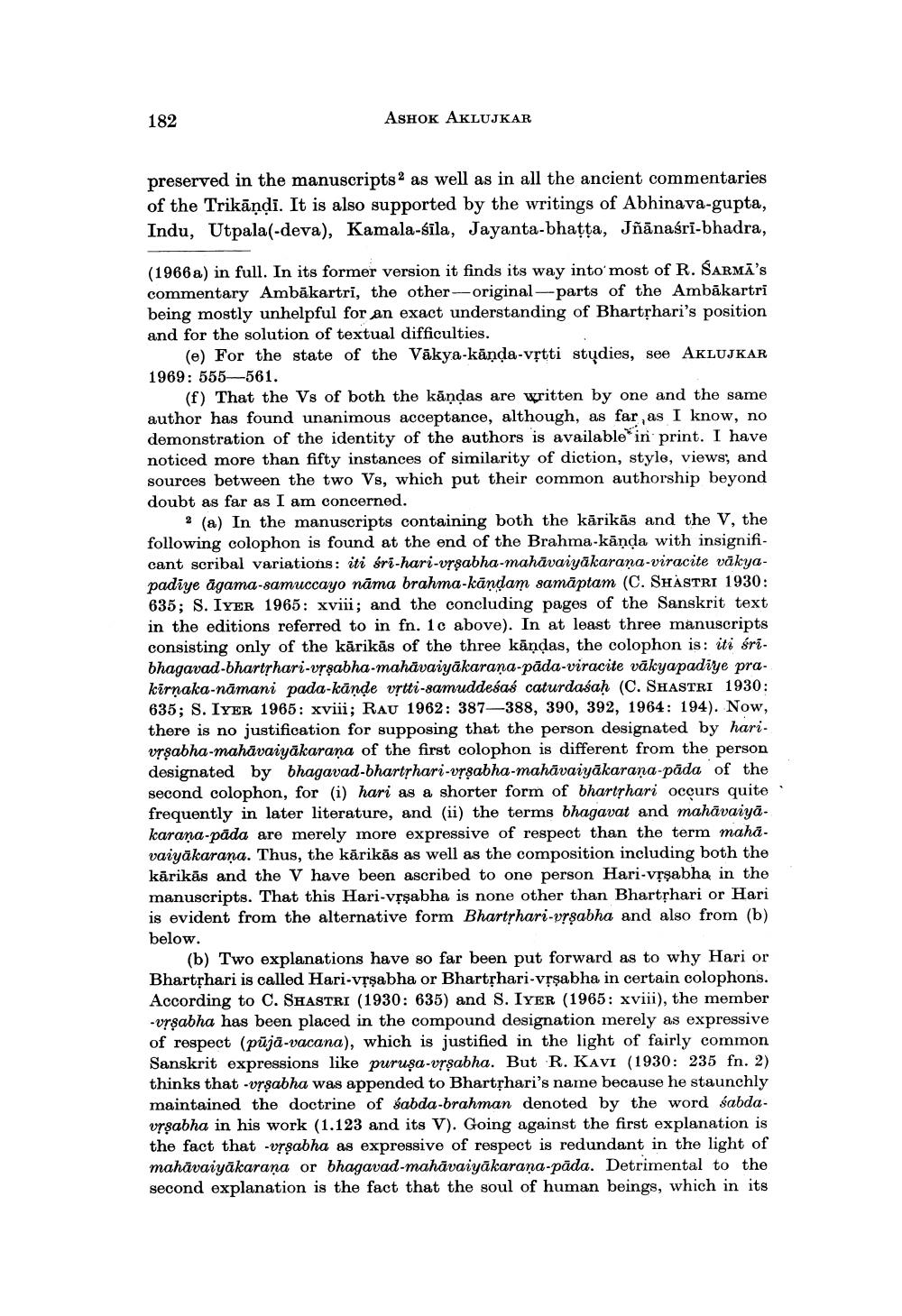Book Title: Authorship Of Vakyapadiya Vrtti Author(s): Ashok Aklujkar Publisher: Ashok Aklujkar View full book textPage 2
________________ 182 ASHOK AKLUJKAR preserved in the manuscripts2 as well as in all the ancient commentaries of the Trikāṇḍi. It is also supported by the writings of Abhinava-gupta, Indu, Utpala(-deva), Kamala-sila, Jayanta-bhaṭṭa, Jñanaśrī-bhadra, (1966 a) in full. In its former version it finds its way into most of R. SARMA's commentary Ambakartri, the other-original-parts of the Ambakartri being mostly unhelpful for an exact understanding of Bhartṛhari's position and for the solution of textual difficulties. (e) For the state of the Vakya-kāṇḍa-vṛtti studies, see AKLUJKAR 1969: 555-561. (f) That the Vs of both the kandas are written by one and the same author has found unanimous acceptance, although, as far, as I know, no demonstration of the identity of the authors is available in print. I have noticed more than fifty instances of similarity of diction, style, views, and sources between the two Vs, which put their common authorship beyond doubt as far as I am concerned. 2 (a) In the manuscripts containing both the karikas and the V, the following colophon is found at the end of the Brahma-kanda with insignificant scribal variations: iti śri-hari-vṛṣabha-mahāvaiyākaraṇa-viracite vākyapadiye agama-samuccayo nama brahma-kāṇḍdam samaptam (C. SHASTRI 1930: 635; S. IYER 1965: xviii; and the concluding pages of the Sanskrit text in the editions referred to in fn. 1c above). In at least three manuscripts consisting only of the karikas of the three kaṇḍas, the colophon is: iti śrībhagavad-bhartṛhari-vṛṣabha-mahavaiyakarana-pada-viracite vakyapadiye prakirnaka-namani pada-kände vṛtti-samuddeśaś caturdaśaḥ (C. SHASTRI 1930: 635; S. IYER 1965: xviii; RAU 1962: 387-388, 390, 392, 1964: 194). Now, there is no justification for supposing that the person designated by harivṛṣabha-mahavaiyakarana of the first colophon is different from the person designated by bhagavad-bhartṛhari-vṛsabha-mahāvaiyakaraṇa-pada of the second colophon, for (i) hari as a shorter form of bhartṛhari occurs quite frequently in later literature, and (ii) the terms bhagavat and mahavaiyākaraṇa-pāda are merely more expressive of respect than the term mahavaiyakarana. Thus, the karikas as well as the composition including both the kārikās and the V have been ascribed to one person Hari-vṛşabha in the manuscripts. That this Hari-vṛşabha is none other than Bhartṛhari or Hari is evident from the alternative form Bhartṛhari-vṛsabha and also from (b) below. (b) Two explanations have so far been put forward as to why Hari or Bhartṛhari is called Hari-vṛṣabha or Bhartṛhari-vṛsabha in certain colophons. According to C. SHASTRI (1930: 635) and S. IYER (1965: xviii), the member -vṛsabha has been placed in the compound designation merely as expressive of respect (puja-vacana), which is justified in the light of fairly common Sanskrit expressions like purusa-vrsabha. But R. KAVI (1930: 235 fn. 2) thinks that -vṛṣabha was appended to Bhartṛhari's name because he staunchly maintained the doctrine of sabda-brahman denoted by the word sabdavṛsabha in his work (1.123 and its V). Going against the first explanation is the fact that vṛsabha as expressive of respect is redundant in the light of mahāvaiyakarana or bhagavad-mahavaiyakarana-pada. Detrimental to the second explanation is the fact that the soul of human beings, which in itsPage Navigation
1 2 3 4 5 6 7 8 9 10 11 12 13 14 15 16 17 18
